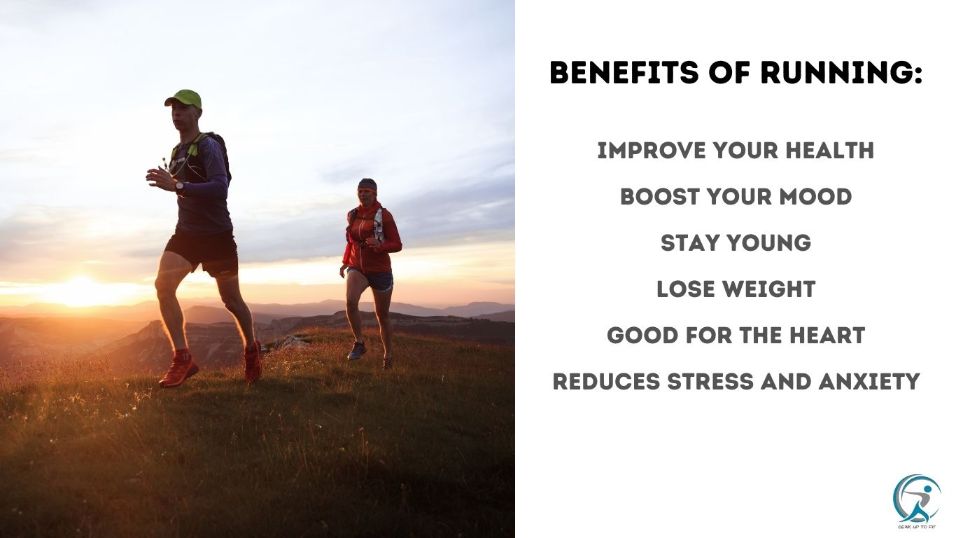Are you new to running? Are you looking to start running but don’t know where to begin? You’re in luck! This blog post will provide 11 tips that will help beginners get started on their running journey.
Whether you are a complete beginner or have been running for a while, these tips will help improve your running experience. So what are you waiting for? Get started today!
What is running, and why should beginners start running

Running for beginners can be intimidating, but several tips help get started. Warm up before running and set time goals instead of distance goals. Find a race to sign up for and use it as motivation. Work on form, challenge yourself and become a more knowledgeable runner. Side stitches can be beneficial, and try a specific breathing technique. Finally, find variety in your training to keep it interesting.
The downside of running is that it is difficult for beginners. Suppose you have trouble controlling your breathing or hobbling with sore muscles. You may want to consider taking up another form of exercise before trying to tackle running. Also, if you already have a health problem like asthma or osteoporosis, you should ask your doctor if running is safe for you before you start this activity.
However, as with any physical activity, running has some risk of injury. Before starting a program, you must ensure you can do so safely. To help you with this process, we’ve put together a list of beginner tips to help you avoid injury while you’re getting accustomed to your new activity.
The benefits of running

Since high school, running has been a part of my life, and it still is today. I love to run. A good run will improve almost every area of my life – from relieving stress to giving me more energy for my family.
If you’re thinking about starting a running habit, here are some of the benefits that may convince you to lace up your shoes:
Improve your health
Running strengthens the heart and lungs and can reduce your risk of developing lifestyle diseases like Type 2 diabetes and heart disease. It also helps with weight management by combining it with a healthy diet.
Boost your mood
A 10-minute jog can improve your mood for up to two hours after you finish it. It’s a proven stress-buster, too – many people go for a run when they’re feeling anxious or tense as it helps them feel calmer and more relaxed.
Stay young
Running is one of the best forms of exercise to slow down aging, especially regarding thinking clearly. Regular running can help keep your brain sharp as you get older!
Running can help you lose weight
You already know that running burns calories, but many people are surprised by how many calories they burn. If one thing makes the difference between losing 1lb or 2lb a week, it’s cardiovascular exercise.
Running affects your appetite
However, calorie-burning isn’t the only reason running is good for weight loss. Exercise affects your appetite and energy needs in ways that dieting doesn’t.
You may feel less hungry when you run regularly because your body doesn’t need as much food to keep going. You may also need more calories because your metabolism increases when you exercise regularly, burning more calories even when resting. Finally, burning so many calories positively affects your hormones, which affects both hunger and satiety signals (the feeling of being full).
Running is good for the heart
The heart is a muscle, and like any other muscle in your body, it becomes stronger with regular use. Running strengthens the heart, pumps blood more efficiently around your body, and reduces your resting heart rate.
Regular exercise, like running, is essential to keep the heart working efficiently – pumping blood around the body and delivering oxygen to our muscles and organs.
Running reduces stress and anxiety
Running is an aerobic activity that strengthens your heart and lungs and improves cardiovascular health. It also helps reduce stress and anxiety. A regular running habit improves sleep quality too. And then there are the physical benefits: weight loss, muscle tone, and reduced risk of diabetes and heart diseases (to name but a few).
How to start running
So, you want to start running? Congratulations! You’ve taken the first step on a fabulous journey toward better health and fitness. Running will change your life, but it doesn’t require expensive kits or gym membership, so as long as you have a decent pair of running shoes, you can get started without spending much money.
It’s very easy to get started. The hardest part is putting on your trainers for the first time. You’ll love it once you’re out there, and I look forward to your next run. Here are eleven tips to get you started on the right foot.
Tips for beginners who are just starting out
Maybe you watched the Olympics and thought, “I could do that,” or your doctor ordered you to get active for health reasons or want to lose a few pounds. It can be hard to know where to start if you’ve never run before.
Here are some tips from experienced runners on how to get going:
Start slow
You’re not running a marathon today. You’re starting a running habit. It can take weeks or even months to build up to running continuously for 30 minutes. You don’t have to run fast — if you’re starting, slow is best.
Set goals
It’s great to have something specific in mind when you hit the road. Maybe you want to head for two miles without stopping by the end of the month. That way, you’ll have something fun and motivating lined up when you reach your goal.
Find people who run
Find other runners — friends and family members if possible- for support, motivation, and companionship — and join a local running club (many are free), which will add structure and accountability to your training routine.
Get gear that fits properly
Look for shoes with solid cushioning in the heel and good arch support. You don’t have to spend much money, but make sure they fit correctly and feel comfortable.
Warm up and cool down
Start with a slow walk or light jog for five minutes to warm up your muscles before running, then end your workout the same way.
Don’t get discouraged
Stick with it, even if you don’t see results right away. It can take eight to 12 weeks of regular running before you notice changes in your fitness level. Trust that the more you run, the better you’ll feel and look.
Running is tough, and there will be days when you don’t want to do it. That’s normal! Just remember why you’re running first and keep at it. The more you run, the easier it will become.
Start a walking program
If running is too intense for you, start by walking briskly. Walking is a low-impact activity that can lead to running if you’re consistent with your training.
Be safe
Run facing traffic to see oncoming cars, and be aware of your surroundings. If you run early in the morning or dusk, wear reflective gear so motorists can see you.
Running is generally a very safe activity, but it’s always best to take precautions. If you’re running outside, wear reflective gear so drivers can see you and be aware of your surroundings. If you’re running on a treadmill, stay hydrated, and don’t overdo it.
Don’t try to start running too fast or far
Just getting started is the hardest part. Once that’s done, it gets easier. Your muscles will adapt to the activity, and you will not feel like you are dying after just a few minutes of running.
Start with walking and then add a few jogging intervals in between walking
You can also run for more extended periods by alternating between walking and running intervals. Over time, increase your distance or speed as you feel ready.
Wear the right shoes for your feet.
Invest in a good pair of running shoes that fit your feet properly. They don’t have to be expensive, but they should feel comfortable when you run in them.
Listen to your body
If something doesn’t feel right when running, stop and figure out the problem. It’s probably nothing serious, but it’s always best to err on caution.
Be accountable
Make sure you have a support system when you begin. There are people to help hold you accountable for your runs. Someone who can push you when necessary to go out there and keep at it Also, people will be there to celebrate with you when you’ve reached certain milestones (e.g., your first 5K).
Don’t focus on how fast or far you run
Focus instead on how much time you spend running each week (even if that’s just 10 minutes a day). Make sure that every run is good quality, though—you want
How to stay motivated for running beginners
One of the hardest things about being a beginner runner is getting started. The first time you lace up your running shoes and head out the door, you’re bound to feel intimidated. You face the usual anxieties of doing something new and challenging, but you’re also stepping into a world unfamiliar to most people.
It’s easy to become overwhelmed by the prospect of running (particularly if you’re starting from a relatively sedentary lifestyle), and it’s tempting to give up before even trying.
To avoid this pattern, new runners must find ways to make it seem less intimidating while still learning the basics.
One way to do this is by staying focused on what’s ahead instead of how far you have left to go. Beginners mustn’t let their minds wander off onto all the other things they could be doing now; otherwise, they’ll get bored or distracted and start looking for excuses not to run.
Even if it just means reminding yourself that it won’t be long until your planned run is over, focusing on the present can help ease some anxiety about straying from your routine.
Another way to stay motivated when running beginner is by giving yourself small rewards. Sometimes
What to do if you experience pain or discomfort while running
If you’re experiencing pain or discomfort while running, here’s what to do:
Ease into it if you’re beginning to run or haven’t run for a while. It’s best not to push yourself or try to do too much. Start slowly and build up mileage over time. It may take months of consistent training to get where you want to be.
Your body is constantly changing, even if you have been running for a long time. What was fine last week may not be fine today — and vice versa. Your body can adapt with regular training. But don’t push it too far beyond what it can handle at any moment.
You can’t always control the weather when you run, but ensure you’ve dressed appropriately for the conditions, so you don’t experience chafing or heat exhaustion.
Make sure your shoes are the right type — and that they fit well and aren’t worn out. If your shoes are old, your feet will feel every bounce against the pavement and carry shock up your legs, leading to injury.
Common mistakes beginners make when starting to run

When beginning to run, there are a lot of things to learn. To avoid getting hurt and get the most out of your workouts, it’s important to remember the basic rules of running. Unfortunately, many runners don’t think about these things, so they get hurt or run less well. Here are some common mistakes made by beginners who are just getting started in their running careers:
Running too frequently
It’s tempting to do a lot of running when you start because it feels good and looks like an easy way to get in shape. Unfortunately, runners can burn out quickly if they run more than three times a week and don’t allow time for rest. Your body needs time to recover between workouts so as not to end up feeling sore or injured.
Running on hard surfaces
When you’re just starting, your body should run on softer surfaces like grass or dirt. It would be best to have support under your feet as you get used to moving with your legs, and smooth surfaces provide this better than pavement or concrete. You’ll also increase your risk of injuries by running on hard feelings if you’re not used to it yet.
Running too fast
Beginners should never push themselves to run faster than they’re ready for. This can lead to injuries and make your runs less enjoyable because you’ll be huffing and puffing. Instead, focus on gradually increasing your speed over time as your body gets used to the activity.
Not warming up or cooling down
It’s essential to warm up before starting so that your muscles are loose and ready to go. It would help if you cooled down after your run to help your body recover and prevent stiffness. Many beginners make the mistake of jumping into their runs without warming up first, leading to injuries.
The importance of setting goals when running beginners
Setting goals is one of the best ways to stay motivated when running. Having something to work towards will give you a sense of purpose and help push you to stick with your training.
You can set different goals, from simple ones like running for a certain amount of time or distance to more complex ones like qualifying for a race or improving your personal best.
Whatever goals you set, make sure they are realistic and achievable. There’s nothing worse than setting impossible goals, as this will only lead to frustration and disappointment.
Start by setting small goals you can easily accomplish, then build up. Before you know it, you’ll meet and exceed all the goals you set for yourself!
Bottom Line
By following these tips, beginners can start running and see improvements in their overall health and well-being. Running is a great way to exercise, relieve stress, and boost energy levels. Give it a try today!
Ultimate Running Quiz: Find Your Perfect Start
References
Running for Beginners: How to Get Started – Verywell Fit
Before a run, it’s best to eat something light and high in carbohydrates but low in fat, protein, and fiber. Aim to finish eating 90 to 120 minutes before you …
11 Steps That Will Get You Running Your First Mile
Once it seems easy, you’re good to start adding in running intervals (more on how to determine your pace below!). You can begin with walking for about nine and a …
How to Start Running: A Beginners Guide | REI Co-op
Start by walking: If you’re new to exercise or have been sedentary for a while, start gently. Work your way up to walking briskly for 30 minutes a day, three …
How to Start Running at Any Age: Strategies and Tips – Healthline
Stretching before and after running: Carve out 5 to 10 minutes before and 5 to 10 minutes after your run to stretch. Focus on dynamic stretches before you exercise and …
How to Start Running – Well Guides – The New York Times
Train three days a week. Run or run/walk 20 to 30 minutes, two days a week. Take a longer run or run/walk (40 minutes to an hour) on the weekend. …
How to Start Running: 9 Simple Tips for Beginners
Keep your gaze on the horizon, not your feet. 5. Start With a Run/Walk Approach. If you’re a running newbie, alternating intervals of walking and running will help you build …
How to Start Running for Beginners (A Complete Guide to Getting Started)
Here are a few tips to help you decide if it’s time to get out your wallet again: (1) Try the press test – Press a thumb into the center …
If You’re New To Running, Here Are 30 Things You’ll … – BuzzFeed
1. Start by warming up (*not* static stretching) before going for a run. A few reps of knee hugs, lunges, and squats will help increase your heart rate and blood …
As a veteran fitness technology innovator and the founder of GearUpToFit.com, Alex Papaioannou stands at the intersection of health science and artificial intelligence. With over a decade of specialized experience in digital wellness solutions, he’s transforming how people approach their fitness journey through data-driven methodologies.
